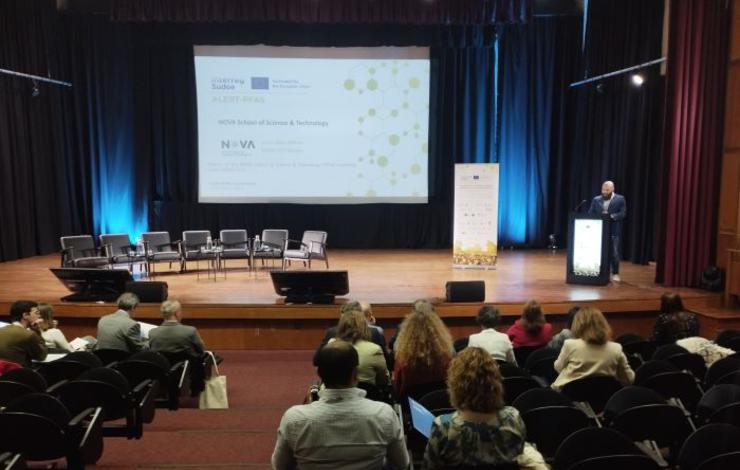10-05-2024

To mitigate the effects of PFAS (perfluoroalkyls and polyfluoroalkyls), highly polluting synthetic chemical substances that are present in various consumer products, from non-stick cookware to clothing and cosmetics, the ALERT-PFAS project coordinated by researchers Ana B. Pereiro and João M. M. Araújo, from the Associated Laboratory for Green Chemistry (LAQV-REQUIMTE), NOVA FCT, was launched on 24 April at Grande Auditório of the NOVA FCT. The project aims to design and implement a transnational strategy to detect, prevent and mitigate contamination by these substances in south-west Europe.
ALERT-PFAS will offer advanced technologies, such as optical sensors, adsorption and degradation processes, polymeric materials, nanotechnology and artificial intelligence, making it possible to detect and monitor PFAS in real time, thus preventing their accumulation and dispersion in the environment. In this project, several pilot actions will be carried out in natural parks and protected areas in Portugal, Spain and France, especially those affected by recent fires.
In addition, ALERT-PFAS also aims to train and sensitize all those involved in the value chain, including the local population.
Co-financed by the Interreg Sudoe cooperation program, ALERT-PFAS has a budget of €1,845,945.00, 75% of which is co-financed by the European Union through the European Regional Development Fund (ERDF). The project brings together experts from the scientific system, technology centers, public bodies, foundations specializing in knowledge transfer and a public body with expertise in firefighting and rescue, and also has the support of 12 associated partners from the three countries.
The institutions involved in the project are: NOVA FCT and Instituto de Telecomunicações (in Portugal); Fundación Empresa Universidad Gallega, Principado de Asturias, CETaqua, Universidad de Vigo and Fundación General de la Universidad de Burgos (in Spain); Université Clermont Auvergne, Centre National de la Recherche Scientifique and Service Départemental d'Incendie et de Secours de l'Hérault Parc de Bel Air (France).
PFAS in the environment
National monitoring activities have detected the presence of PFAS in the environment across Europe, and the production and use of these compounds in products have resulted in the contamination of drinking water supplies in several European countries. In highly polluted areas, PFAS concentrations in drinking water have exceeded the limit value proposed for individual PFAS in the 2018 European Drinking Water Directive.
Long-chain PFAS accumulate in humans, animals and sediment/soil, while short-chain PFAS accumulate in the environment due to their persistence and high mobility in air and water. The Eternal Pollution Project's assessment concluded that a considerable proportion of the European population could exceed the tolerable weekly intake due to exposure to PFAS through food and drinking water. In turn, the costs to society of exposure to PFAS are high, with annual health costs estimated at between 52 and 84 billion euros across Europe, according to a recent study (the Eternal Pollution Project).
Na imprensa:
https://expresso.pt/sociedade/2024-04-18-alerta-poluicao-eterna-projeto-...